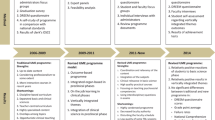Abstract
This study evaluates a language education program and assesses the influence of this program evaluation on program performance and stakeholder professional development. The research design makes use of mixed paradigms and methods. Positivism is followed to verify the extent to which the program meets predetermined quality standards through quantitative evaluation research, questionnaires and document and record analysis. In contrast, the qualitative paradigm is followed to uncover program evaluation impact on program components and stakeholders through qualitative evaluation and interviews. The study concludes the program maintains satisfactory overall performance with some components performing better than others. Likewise, evaluation of program evaluation improves program elements and faculty and program administration professional skills. The study therefore recommends program evaluation as an effective program improvement strategy. Program evaluation is also an effective professional development strategy that provides program administration, staff and faculty members with onsite opportunities to develop their professional skills. Moreover, evaluation of program evaluation should be an integral part of program evaluation to help program stakeholders not only do but also use evaluation alongside decreasing resistance to imposed review and reform.
Similar content being viewed by others
References
Anderson L., Olsen B.: Investigating early career urban teachers’ perspectives on and experiences in professional development. J. Teach. Educ. 57(4), 359–377 (2006)
Arnold N.: Online extensive reading for advanced foreign language learners: An evaluation study. Foreign Lang. Ann. 42(2), 340–366 (2009)
Bernhardt E.B.: Student learning outcomes as professional development and public relations. Mod. Lang. J. 90(4), 588–590 (2006)
Bloom M., Fischer J., Orme J.: Evaluation Practice: Guidelines for the Accountable Professional, 6th edn. Allyn and Bacon, Boston (2009)
British National Standards Body: About Standards. http://corpslakes.usace.army.mil/employees/faqs.cfm?Id=perf-measure. Accessed 14 June 2011
Byrnes H.: Perspectives. Mod. Lang. J. 90(iv), 574–576 (2006)
Carsten-Wickham B.: Assessment and foreign languages: a chair’s perspective. ADFL Bull. 39(2&3), 36–43 (2008)
Chase G.: Focusing on learning: reframing our roles. Mod. Lang. J. 90(4), 583–588 (2006)
Clarke A.: Evaluation Research: An Introduction to Principles, Methods and Practice. Sage, London (1999)
Coakes S.J., Steed L.: SPSS Version 14.0 for Windows: Analysis Without Anguish. Wiley, Milton (2007)
Cohen L., Manion L., Morrison K.: Research Methods in Education, 7th edn. Routledge, London (2011)
Council for Higher Education Accreditation: The Fundamentals of Accreditation. CHEA, Washington (2002)
Craft A.: Continuing Professional Development: A Practical Guide for Teachers and Schools. Routledge, London (1996)
Dassier, J.P., Powell, W.: Formative foreign language program evaluation: Dare to find out how good you really are. Dimension 2001: The odyssey continues. In: Selected Proceedings of the 2001 Conference of the Southern Conference on Language Teaching, Birmingham, AL, pp. 15–30, 2001
Elder C.: Reconciling accountability and development needs in heritage language education: A communication challenge for the evaluation consultant. Lang. Teach. Res. 13(1), 15–33 (2009)
European Network for Quality Assurance in Higher Education: Quality Assurance in the Nordic Higher Education—accreditation-like practices, ENQA Occasional Papers (2), Helsinki, Finland, p. 7. http://www.enqa.eu/files/nordicquality.pdf. Accessed 21 June 2011
Gorsuch G.: Investigating second language learner self-efficacy and future expectancy of second language use for high-stakes program evaluation. Foreign Lang. Ann. 42(3), 505–540 (2009)
Houston T.: Outcomes assessment for beginning and intermediate Spanish: one program’s process and results. Foreign Lang. Ann. 38(3), 366–376 (2005)
Kiely R.: Evaluation, innovation, and ownership in language programs. Mod. Lang. J. 90(4), 597–601 (2006)
Kiely R.: Small answers to the big question: Learning from language programme evaluation. Lang. Teach. Res. 13(1), 99–116 (2009)
Kiely R., Rea-Dickins P.: Program Evaluation in Language Education. Palgrave Macmillan, New York (2005)
Kvale S.: Interviews: An Introduction to Qualitative Research Interviewing. Sage, Thousand Oaks (1996)
Lynch P.K.: Language Program Evaluation Theory and Practice. Cambridge University Press, Cambridge (1996)
Middlebrook G.C.: Evaluation of student services in ESL programs. In: Pennington, M.C. (eds) Building Better English Language Programs: Perspectives on Evaluation in ESL, pp. 135–154. NAFSA, Washington (1991)
Norris J.M.: The why (and how) of assessing student learning outcomes in college foreign language programs. Mod. Lang. J. 90, 576–583 (2006)
Norris J.M.: Understanding and improving language education through program evaluation: introduction to the special issue. Lang. Teach. Res. 13(1), 7–13 (2009)
Patton M.: Qualitative Evaluation and Research Methods, 2nd edn. Sage, Newbury Park (1990)
Pawan F., Thomalla T.G.: Making the invisible visible: A responsive evaluation study of ESL and Spanish language services for immigrants in a small rural county in Indiana. TESOL Q. 39(4), 683–705 (2006)
Rivera G., Matsuzawa C.: Multiple-language program assessment: learners’ perspectives on first- and second-year college second language programs and their implications for program improvement. Foreign Lang. Ann. 40, 569–583 (2007)
Ross S.J.: A diachronic coherence model for language program evaluation. Lang. Learn. 53(1), 1–33 (2003)
Rossi P., Freeman H., Lipsey M.: Evaluation: A Systematic Approach, 6th edn. Sage, Thousand Oaks (1999)
Sanders R.: Redesigning introductory Spanish: increased enrollment, online management, cost reduction, and effects on student learning. Foreign Lang. Ann. 38, 523–532 (2005)
Shaw I., Lishman J.: Evaluation and Social Work Practice. Sage, London (1999)
Shawer S.F.: Classroom-level teacher professional development and satisfaction: Teachers learn in the context of classroom-level curriculum development. Prof. Dev. Educ. 36(4), 597–620 (2010)
Shawer S.F.: Standardized Assessment and Test Construction Without Anguish: The Complete Step-by-Step Guide to Test Design, Administration, Scoring, Analysis, and Interpretation. Nova Science Publishers, New York (2012)
Stake R.E.: Program evaluation particularly responsive evaluation. Multidiscip. Eval. 7(15), 180–201 (2011)
Sullivan J.H.: The importance of program evaluation in collegiate foreign language programs. Mod. Lang. J. 90(4), 590–593 (2006)
Sywelem M., Witte J.: Higher education accreditation in view of international contemporary attitudes. Contemp. Issues Educ. Res. 2(2), 41–54 (2009)
Topkaya E., Kucuk O.: An evaluation of 4th and 5th grade English language teaching program. Elementary Educ. Online 9(1), 52–65 (2010)
Author information
Authors and Affiliations
Corresponding author
Rights and permissions
About this article
Cite this article
Shawer, S.F. Accreditation and standards-driven program evaluation: implications for program quality assurance and stakeholder professional development. Qual Quant 47, 2883–2913 (2013). https://doi.org/10.1007/s11135-012-9696-1
Published:
Issue Date:
DOI: https://doi.org/10.1007/s11135-012-9696-1




